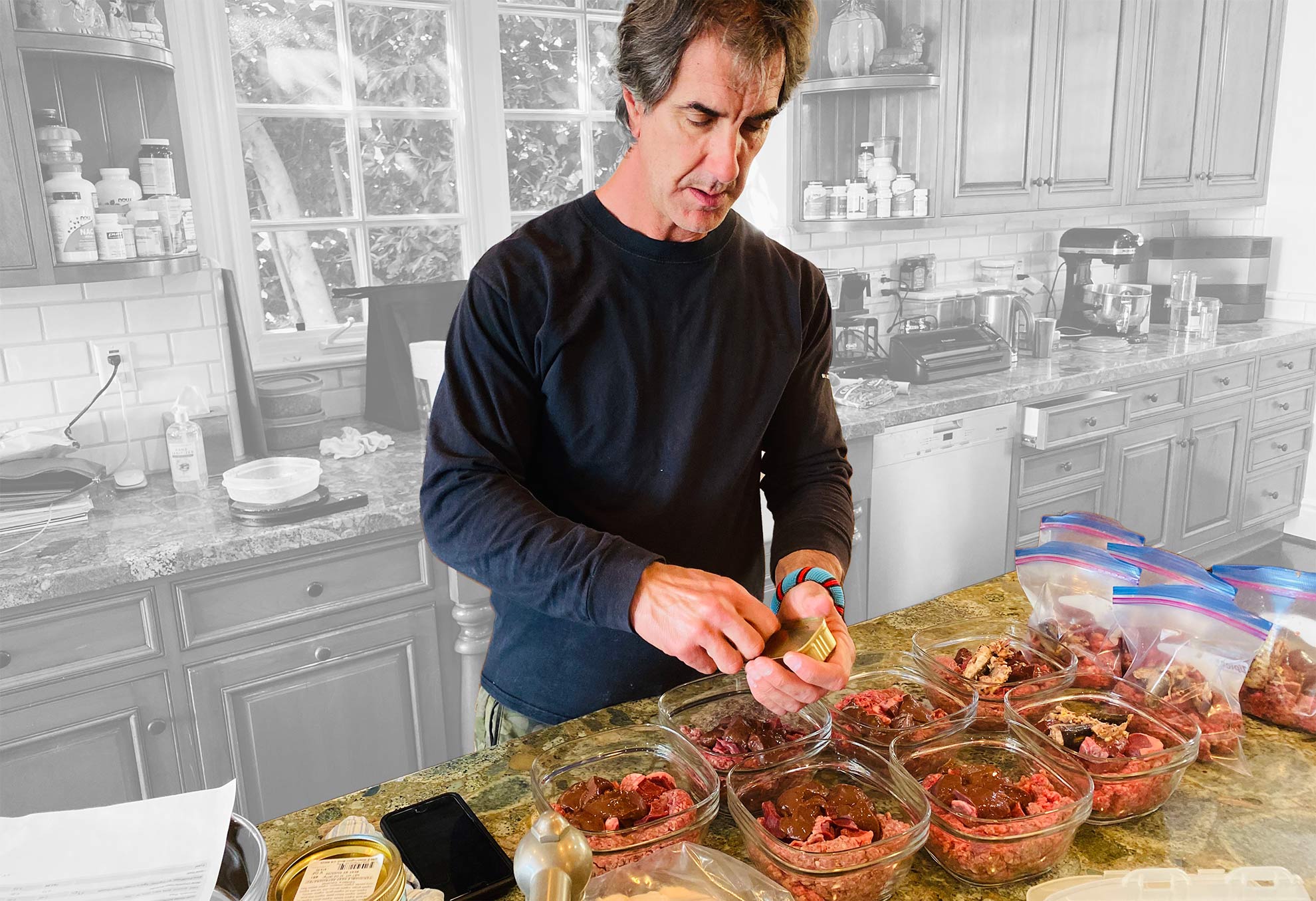Ever eat something that seems like a good idea today and wake up the next day to feel sluggish or less than yourself? Even though the food tasted good at the time, it sure doesn’t feel good afterwards. The saying “Let food be thy medicine” was stated by Hippocrates over 2000 years ago and it still holds true today, and it works for us and for our dogs.
Imagine what processing and digesting food does to our body. You wouldn’t drink dirty water, but we certainly eat dirty food, and we oftentimes don’t think too much about the food we feed our dogs.
Undoubtedly there are dogs who live long lives on a terrible diet and others who die prematurely being fed a wholesome diet. Perhaps it is a coincidence, but experts agree that a healthy diet is a contributor to overall health.
Our dogs don’t have the luxury of seeking out their own food, they rely on us for it. And it’s probably the biggest responsibility we have. Before medical care or training, feeding our dogs is the single most important decision we make, but it’s complicated. It is made more confusing by the brilliant marketing teams at pet food companies and the barrage of information available on the internet today. I’ve been obsessed with food for many many years. Food for me as well as for my dogs. So I’d like to break it down simply for you in this article. This will not be a complicated, scientific analogy – rather a common sense look at health and nutrition.
Forgetting the catchy fads and labels we put on food, let’s keep the conversation really simple. What are the ingredients? And what do dogs (and any animals) need? Food is fuel. Food gives us the energy to live and repairs our bodies constantly. We are a complex organism that is constantly regrowing, so food must be a part of that growth, if not it will be a part of the organisms destruction.
Our organism is created of proteins that make up our muscles and those need to constantly be built. When I look at my dog’s food, I do a couple of things:
- Read the ingredients in order. What are the very first ingredients and are they beneficial? Do they include fillers and things you can’t pronounce or are they real food?
- Of the ingredients I know, how many are important and how many are filler?
You may wonder why I’m so obsessed with fillers. The reason is simple, because they serve no purpose except to make the dog feel full. Think about the price of meats and veggies, then think about the price of a bag of dog food. Can you buy the meats and veggies that make up a bag of dog food for the same price or less than the cost of that food? If you can’t, then how can the company who makes the food? How can they buy the ingredients, make the food, market and advertise the food and still make a profit…. And believe me, they make a profit.
Simple facts, we need protein to build and repair muscle and we need fuel to keep us going. Protein is simple, clean protein from a host of sources. I’m not a big believer in plant based protein as a primary source even though I was a vegetarian for 10+ years. I find animal protein to be a superior source, and barring anyone’s ethical objections, I’m stating this as I have discovered it to be true. The protein can be from any source that you may choose, but choose carefully to avoid over processed, hormone treated and ladened with toxins. Some people opt for wild game such as venison. That choice will be yours to make. I choose beef and avoid poultry for my dogs.
The secondary ingredient is paramount to me. What is the filler? Some use rice, corn, potatoes, etc. Imagine your dog walking up to rice, corn or potatoes and choosing that over meat. They won’t. The times when dogs would choose that is if nothing else is available. Corn is very hard to digest for people and dogs and you’ll often see it in its original shape coming out the other end of your dog. Instead of thinking of veggies as filler, think of them as a good source of nutrition and fiber. I like to feed cruciferous vegetables to my dog including broccoli and cauliflower. Other veggies I like to include are spinach and brussel sprouts. You’ll rarely see these ingredients used in commercial food because they are expensive. Manufacturers seem to prefer things like corn, potatoes and pumpkin. If you compare the prices in your grocery store, you might understand why. I’m not saying that you should spend a fortune on your dog if you can’t afford it, just make some good choices.
Choosing food for your dogs should be just that, choosing food, not a dog food bag. Some people opt to make their dog’s food at home (cooked or raw) others choose to buy it. Lets dive into this.
Home Prepared Meals:
The most common thing people will do is prepare their dog’s food by cooking some meat and starch, such as chicken and rice, beef and potatoes, etc. Adding things to the ingredients makes people feel better about the menu, but oftentimes adds unnecessary additives. For example, some foods are very high in sugar: carrots, apples, blueberries, etc. Higher glycemic indexes can lead to more inflammation and possible health risks.
The newest concept seems to be the keto genic diet: high protein, high fat, low carbs / sugar. This diet has shown good results in health, fitness as well as an interesting study at the KetoPet Sanctuary where tests were done giving dogs with multiple stages of cancer a purely ketogenic diet (along with treatments) and the results were dramatic. The basis of this idea is that starches and carbohydrates give fuel to cancer cells. Dogs can derive energy from fat as they would in a natural predator diet.
To Cook or Not to Cook:
One of the biggest controversies seems to be whether or not to cook our food. Does cooking food cook the nutrients out of the food? Original (and hard core) RAW feeders will say it does. However, current ideas seem to contradict this. There are several articles online that talk about the increase in brain size linked to cooking foods on fire. Do a simple search on brain size and fire cooking. The concept behind this is that cooked food is more efficiently metabolized, using less of the body’s energy. Whatever your position on this doesn’t matter. What we can agree on is that food should be healthy and nutritious. So don’t let cooked vs. raw keep you from making good food choices.
It’s obviously beneficial to know what you are feeding your dog, but some people don’t have the luxury of the time it takes to prepare food for this dogs. So don’t feel guilty.
Store Bought:
There are new services that will curate special diets for your dog, and on the surface it sounds good. But take a second look. Often these diets will include immense amounts of fillers just like in kibble. READ the INGREDIENTS. Large amounts of potatoes and fillers are not worth the money you’re spending. If you want to follow a ketogenic idea, you’ll need to eliminate starches such as pumpkin, carrots, potatoes, rice, etc. Because they will turn to sugar. These will need to be replaced by fats. This can be animal fats or other healthy fats such as fish fats and coconut oil.
There are kibble diets available that are Ketogenic, you’ll just need to double check that they are what they say they are.
If you want to stay with a traditional diet, be aware of trends like grain free. It’s become a recent phenomenon to avoid grains and instead replace them with a different filler such as chickpeas. Removing grains from a dog’s diet that has no issues with grains makes no sense, especially if you replace it with another filler.
If you’re on the fence between canned and kibble, because you think the can is healthier, remember that there is an immense amount of water in canned food which makes it seem fresher, but is just another way to take up space and weight.
INGREDIENTS INGREDIENTS:
It will always come down to the ingredients you’re feeding your dog. The quality of the ingredients is primary. Bad chicken, beef, venison, etc. is bad PERIOD. Cheap fillers are bad PERIOD.
Feed your dog a simple diet, yes SIMPLE. Dogs, unlike humans, are simple creatures. Most animals exist on a few simple ingredients. We need something sweet, something soft, something hard, something bitter, etc. We get bored with the same food. Dog’s don’t. A freshly killed rabbit is a delicacy to a dog, save the ice cream!
Like it or not, some of the extra ingredients in dog food may not be things you would choose, but that doesn’t make them unhealthy. For example some of the “meal” ingredients include ground body parts including, bone, beaks, feathers, feet and other renderings. This is not necessarily unhealthy because a dog would eat these parts, and enjoy them. What makes them unhealthy is the source. For example using meal sources from euthanized animals can put ingredients into your dog’s food that could be fatal, as could using diseased meats.
Vegan Dogs:
You’ll often see vegetarians and vegans making some interesting points about the benefits of a plant based diet for dogs (as well as for themselves), but I find it unhealthy for both dogs and people. I speak from experience having been a vegetarian for more than 10 years. More often than not, these people’s claims are rooted in having recently become vegetarians and the amazing health they enjoy. Suddenly they’re eating clean foods and feel better. However previously they were eating junk food and soda! Well it’s no wonder! Good food is good food, being extreme leads to no good.
There can be an ethical argument for not eating meat, but certainly not a healthy one. Stripping your diet completely of vegetables or meat is, in my opinion) not a wise choice, as well as for our dogs. Furthermore, dogs are natural carnivores (actually omnivores) which means they can survive on both meat and plants. Given the choice between a potato and a piece of meat, most every dog will choose the meat.
Supplementation:
Dog food companies will add certain supplements to food for the health of the dog. Many of these are present in the plant and meat sources, but may need to be added in home cooked meals. These can include salt and bone meal / calcium as well as omegas. Do your research to make sure that you’re giving your dog a healthy diet.






